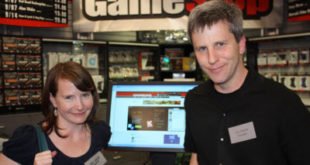Gearbox Entertainment CEO Randy Pitchford said that selling his company to Embracer Group for up to $ 1.3 billion in cash and stock will be good for both gamers and his 550 employees.
The employees own 30% of Gearbox, the maker of the Borderlands action-RPG series, and they will be getting paid both upfront and over time, given how the deal’s structured. Their incentive is to create new games that players love.
The companies are referring to the deal as a merger, as it involves mostly stock transactions. Gearbox is only getting $ 188 million in cash and $ 175 million in stock upfront. The rest of it comes over six years if Gearbox meets financial and operational targets. Pitchford said in an interview with GamesBeat that the deal is good for gamers because Gearbox will be able to work on more games without worrying about access to capital or relying upon external publishers for funding. (2K noted that it still has a publishing relationship with Gearbox for Borderlands.)
I spoke with both Pitchford and Lars Wingefors, the group CEO of Embracer Group in Karlstadt, Sweden. Wingefors said in an interview that Gearbox will operate on its own and pursue its own creative vision.
“We are active, but I think we’re very different,” said Wingefors. “It’s not about competition as such, but it’s about reaching out to people talk to people. If you don’t meet people, they don’t know the alternatives.”
Pitchford said the deal had its roots in the company seeking to raise some capital. Jenna Hardy, a Warner Bros. and Disney veteran, came aboard four years ago as chief financial officer and put the processes in place to position Gearbox for some kind of transaction. Pitchford said the team wanted to get chances to do more games that they believed in, instead of being able to only build games that traditional publishers would bet on with Gearbox.
The company set up its own publishing business, and it brought in former Marvel leader Sean Haran as chief business officer. Their plan was to round up a new round of capital but without parting with Gearbox’s cherished intellectual property.

Above: Randy Pitchford is CEO of Gearbox Entertainment.
In that process, they came upon Embracer Group. Wingefors said his company could provide capital and autonomy, and this would allow Gearbox to focus on creation. Pitchford said he was “shocked” to understand Embracer’s model as a holding company for decentralized game studios.
“I’m not really a business guy. I’m a creator. I’m a builder,” Pitchford said. “I’m a coder and a designer that had enough luck in this industry that that things grew with us. And so we realized we’ve got this engine. We’ve just demonstrated our ability to scale the creative engine because we started the Quebec studio, and we’re able to prove that we can use our processes or methods or culture and scale with people. So now what’s limiting us is the capital to invest in our efforts.”
Pitchford said that through both publishing and internal development, Gearbox has a lot of games in the works, including Homeworld 3. He said that Gearbox, founded in 1999, has enjoyed profitability for 22 years. It has sold more than 100 million games in its history.
Here’s an edited transcript of our interview.

Above: Lars Wingefors is Group CEO of Embracer Group.
GamesBeat: I’m in a bit of shock that so many deals have been happening so quickly that were announced Tuesday night. Lars, why have you been so busy compared to all your slower-moving competitors in this business?
Lars Wingefors: I don’t know if I’d agree they’re slower. I know of a few that are very active. I love that competition, in a way. We’re active, and they’re active. But we’re very different. It’s not about competition as such. It’s about reaching out to people, talking to people. If you don’t meet people, they don’t know about their alternatives. We’re doing this every day. It’s not only about me. We don’t quite have 50 people full-time, but if you count all the CEOs and various people engaging in the Embracer process, advisers and so on, it’s a lot of people. It’s an everyday thing.
Transactions and getting fantastic companies like Gearbox — this is the biggest acquisition of my life. It’s not even an acquisition. It’s a merger. That’s a quite important point, that differentiation between others and Embracer. We’re building something together. We’re taking equity and we have a long-term vision together.
GamesBeat: I watched the presentation, Randy. Why was it a good time for you to do this?
Randy Pitchford: We’d started a process to raise some capital. You know enough about the history of Gearbox. We started out doing work-for-hire. We were successful enough that within the margins of that work, we could build original IP and do some things there. Within the margins of that success in turn, well, how do we get a chance to build more of the games we like and build even bigger success? Going from only being able to build games that traditional publishers would bet on.
We built a publishing business so that we could have access to platforms and access to customers. As we did all this, we started to realize that our limiting factor changed. It used to be that the limiting factor was people. How much can I work on with my team? I’m not really a business guy. I’m a creator, a builder. I’m a coder and a designer that had enough luck in this industry that things grew with us.
We realized that now we have this engine. We’ve demonstrated our ability to scale the creative engine. We started the Quebec studio and were able to prove we could use our processes, our methods, our culture, and scale with people. Now what’s limiting us is capital to invest in our efforts. We have to figure out how to get access to capital.

Above: Homeworld 3 is coming from Blackbird Interactive.
I started out trying to figure that out. I recruited Jenna Hardy, our CFO. She did eight years at Warner and eight years at Disney. She’s world-class. She built out a robust and rigorous financial system that could support all this ambition. I brought in some executive team support with Sean Haran, who was director of business development at Marvel Studios and Riot. He knows what he’s doing. We started — let’s now attack this, getting the best advisors in the world from a financial point of view, and then looking out to raise capital.
What I thought the plan was going to be was we’d sell a small portion of our company. Maybe do the same play that Epic did, where we sell a portion of the company and use that capital to build the next Fortnite, or whatever Gearbox is capable of. Along the way there was tremendous interest in that, as you can imagine, but there are tradeoffs as well. You’re necessarily diluting your existing shareholders before you’re fully realizing the value you’ve created. There’s almost inevitably a next step as well.
I put a huge amount of time in this, and my time — where I’m most valuable to the world is if I’m spending as much time as possible working on games. I’m less valuable when I’m spending time on business. Lars came along and said, “Hey, I don’t know if you’re aware of us, but we’re exactly what you need. We exist to give people like you the resources you need to run as fast as you can. Our business model only works if you have the autonomy and the independence you’re looking for. That’s the foundation of our model.”
It shocked me. I never imagined such a thing could exist. When I realized who Lars was and what he built, I realized that this is the perfect group for us to become a part of, to achieve our ambitions and realize our mission of entertaining the world. We figured it out. It wasn’t what I expected. Gearbox doesn’t need to do this. It’s just that we have the capability to go so much faster than we would ever be able to if we continued to only grow within the margins of our own success. With the support of Embracer we’re going to explode.
GamesBeat: I see that there’s great value as a reward for what you’ve already done here. The way the deal is structured, it also suggests that Gearbox is still going to be here for the long-term. Are there some specific things that you see that make this good for your employees, and for your players? We see all this change and consolidation in the industry right now. I’m sure gamers wonder what might be happening here.
Pitchford: For gamers there’s a couple of things to look at. One is, if you look at the IP that Gearbox already has, you can see there’s some incredible and value IP, and all of it has fans that have more demand for entertainment within this IP than we’ve been capable of delivering. To have the resources for us to chase and pursue and build the kind of content and entertainment that our customers demand from us with all of the existing IP, that should be welcome. The customers are demanding it from us and we’re doing the best we can to live up to that.
If you also consider, when Gearbox invents, when we have the opportunity to build new IP, we tend to do things that could be a little disruptive. With Borderlands we invented a new genre. Before Borderlands, no action game had RPG mechanics and metagame like that. Now, every game does. We were the ones that showed that not only was it viable, but it was the most engaging way to interact with the balance between the moment to moment fun of an action game design and the long-range engagement that can come from a more meta design.

Above: Brothers in Arms: Hell’s Highway is an older Gearbox game.
Even if you go simpler with Brothers in Arms, we took what was a very simple reaction-time skill test in the traditional war shooter genre, and we flipped it on its head and made it a thinking game. We made a strategic game, but in first-person real-time with the tactical gameplay. We love innovating like that.
We have so many new IP concepts that are in our incubator, that are ready to explode. We could wait for the right publishing partner who’s willing to make a bet, rather than only take a risk on something they know Gearbox has already done before. Those publishers that have taken risks on us for what we want to see next have always been rewarded. But for some reason they can’t be comfortable with that kind of risk. Now we get to take that risk.
We don’t have to burn the boats to do it. When Epic did their deal, they ended up selling Gears of War to Microsoft. They burned the boats to show they could do something you’d never expect from Epic before, and [gaming] got Fortnite out of that. We don’t have to do that. We can maximally deliver on the IP we have and pursue new IP as a consequence of this relationship. That’s incredibly exciting for me. I feel like we’re just getting started.
I don’t know how many years I have left, but I want to get as much done as I can while I’m still useful to this industry, while I’m still useful to people who want video games. I’ll do it as long as the world wants me to. I intend to die in office. I hope that’s a long time from now.
That’s the gamer-side. Let me talk about the employee-side.
I own Gearbox, but so do the employees. Thirty percent of Gearbox is owned by the employees. From a consideration point of view, this is an incredible day. Philosophically, I’ve always tried — one of my visions when I started this company, I’m a creator. I’m a coder and a designer who was in the trenches with every other developer. When I started Gearbox, I did so with a thesis that those who create value should participate in it. Gearbox has had the most generous royalty bonus program in the history of the industry. That’s created alignment between every single person that participates in the profitability of our products. But we never imagined trading on the value of the company itself.
In that time — rewind to when I was thinking we were going to need to raise capital. That’s when I reformed Gearbox as a “C” corp. from an LLC and created an employee stock option program. I gave 30 percent of the company away to the employees. I did that because I wanted to make sure we had alignment. The success in this endeavor does not happen because of a guy like me coming up with a creative idea and then hiring and directing a bunch of people. It happens because a bunch of people all believe in it and are committed and aligned to a goal. That has to be true for the creative components, but it’s also best if it’s true for how the business and economics of all that works. We’ve always prided ourselves on alignment.
When we talked to the team about it, it was a party. Generally, the people that are part of Gearbox tend to be quiet. But on social media there were a lot of pictures of folks with champagne glasses and whiskey glasses toasting the moment. It’s not just about what it means for them right now. You said it yourself. This deal is structured. It’s about what we’re going to be building and what this enables us to do in the future.

Above: Borderlands 3 is one of Gearbox’s flagship games.
GamesBeat: Why is the deal structured this way? What can you tell us about what’s happening in the larger industry right now? We’re in a rare moment, one that I’ve never seen.
Wingefors: First of all, the Embracer model is based on a decentralized model where we have ambitious people, entrepreneurs, and creators, who want to build something greater, something more, and stay on. We share the ups and downs of that. We give each other resources. It’s quite simple in a way. I trust my people. That’s what we’re looking for. Thank god, in this industry there are tons of great people who fit very well into Embracer. That’s why we’ll continue.
Most of the mergers or acquisitions, as you say, are done further down. Publishers adding more development resources and so on. Gearbox being a very sizable business and Randy being a great leader and entrepreneur, they will form their own unit that can consolidate if they want to, but they will grow organically.
Looking at the wider space, obviously, we have interest rates near zero. There’s more capital than ever. Gaming is booming. I wouldn’t say there’s too much capital. But capital is not a scarce resource anymore. Talent and long-term thinking are scarce resources. For us it’s not a big difference today from what it was a year or two years ago. We can continue doing what we’re doing and become greater at it. The bigger we become, the greater we become combined.
GamesBeat: A lot of times, when companies do big deals or big mergers, they have to digest it. They spend a lot of time making sure that they execute. Is that what we could expect from you, or do you think, given the way you set up, that you can continue doing deals, even after taking a big bite here?
Wingefors: You need to understand the structure. I’m buying into Randy and the management. I’m trusting them. By doing that, we don’t need to put a controlling function in place, micromanaging anything. Our model wouldn’t work if we were creating a central headquarters with 500 people asking questions about business plans. That’s not our model. Our operating model, with these operating groups — we have eight of them, starting this morning — that’s the key to our success. That’s why we’re able to grow at a pace that others can’t. We have people like Randy and many others.
Obviously, we are a public company, one of the most traded shares. We’re held by Canadian pension plans and hundreds of other institutions. I take pride in having benchmarks, or trying to in the long term — being a benchmark in terms of reporting. We’re going step by step. That’s one kind of entrepreneurship. Not creating a game, but creating a different kind of vehicle. Centrally, we have people who, from that perspective, will have financial control, will have the control we need to have in order to report and disclose and build trust. But also to help the companies to — I don’t need to tell them, but if they look at their business they’ll see what is working and not working. Some companies have fantastic systems and some don’t. Sometimes you just need to give them the tools.

Above: Borderlands 3 was a remarkable marketing success
GamesBeat: Randy, can you go over why this particular deal stood out among other ones that were possible, and why you’re comfortable with having so much of the consideration come later on rather than right away?
Pitchford: I can answer the second part first. I’ve never had any difficulty betting on us. All the evidence and experience suggests that the more autonomy that Gearbox has, the more success it’s able to build. If you look at the history of our games, the games we did on our own without any outside influence are the ones that tend to have the biggest results. The more outside pressures and influences that come on us, the more difficult it is. It’s easy to bet on ourselves, especially in an environment that’s engineered to empower our autonomy.
To the first part, it never occurred to me — I’ve always been allergic to the concept of M&A. In our entire history, since the very first product, every single partner company we’ve worked with, whether carefully hinting or just overtly offering, has wanted to talk to us about an acquisition. Many companies we’ve never worked with would hit us with a cold call, an unsolicited proposal. I’ve always been allergic to that, because like Lars was saying, the typical approach is centralized. It’s more of a constrictive approach. It assumes that we can’t make our own way, that we don’t know how to win with what we’re experts at.
Lars looks at us and sees that we’ve been winning with what we’re expert at in the face of those pressures, on our own. “We need to do the opposite of control. We need to fuel them. Let’s see how fast and far entrepreneurial groups like Gearbox and the other members of the Embracer Group can run if they’re empowered instead of held back.” It never occurred to me that that model could exist. When I realized what Lars had built, what he was doing, and what the strategy was, it is simple and obvious, yet it’s completely counterintuitive to the way the rest of the industry works. I realized that Lars isn’t the suit that I’ve been navigating around. Lars is me, just coming at it from the access to capital point of view. I come at it from building the product.
You heard him say it clearly earlier. For Lars, access to capital is not a problem at all. The problem for Lars is, who can actually build stuff successfully and knows how to scale a creative engine? That’s what’s rare and valuable. For us, building creative teams and organizing them and always shipping — even our worst examples are real products that have a market value. We’ve never lost money. To us, that part of it — I feel like Neo in the Matrix after he sees it. I just need more capital so we can do this faster and better. He’s on the opposite with the capital, just needing talent like us. It’s a brilliant arrangement.

Above: The line for Borderlands 3 was long just minutes after Gamescom 2019 opened.
GamesBeat: It did surprise me that you’ve had consistent profits for all 22 years. On the games you talked about, I wonder whether these were more publishing efforts, or there was something that a lot of the Gearbox staff is sinking their teeth into right now? Is Homeworld 3, for example, the one where you have a lot of people right now? Or is that in some way farmed out?
Pitchford: Homeworld is in production. We’re doing that game with a development partner, Blackbird Interactive. I wouldn’t call it farmed-out. Rob Cunningham was literally the founder of Relic. He created the Homeworld franchise. Blackbird is his latest company. We partnered with him and his team when they did the prequel to Homeworld, Deserts of Kharak, which Gearbox published and financed, of course. The Homeworld Remastered Collection, he had a part to play there. I’m just thrilled that the world that’s been waiting for Homeworld 3 is going to get it, and it’s amazing.
Honestly, that’s just scratching the surface of all our plans. The plans are a spectrum of internally developed games with Gearbox IP, internally developed games with original IP from Gearbox, external partners that are both publishing partners, where we’re publishing them in a second party relationship, and then there are also other developers working on Gearbox IP as well. That can expand, especially as we start interacting without friction with other members of the Embracer Group that have some interest. There are a lot of folks that would love to work on Gearbox IP, and Gearbox would love to help some of the Embracer Group games that might be stronger in other markets be published more effectively in North America.
GamesBeat
GamesBeat’s creed when covering the game industry is “where passion meets business.” What does this mean? We want to tell you how the news matters to you — not just as a decision-maker at a game studio, but also as a fan of games. Whether you read our articles, listen to our podcasts, or watch our videos, GamesBeat will help you learn about the industry and enjoy engaging with it. How will you do that? Membership includes access to:
- Newsletters, such as DeanBeat
- The wonderful, educational, and fun speakers at our events
- Networking opportunities
- Special members-only interviews, chats, and “open office” events with GamesBeat staff
- Chatting with community members, GamesBeat staff, and other guests in our Discord
- And maybe even a fun prize or two
- Introductions to like-minded parties



